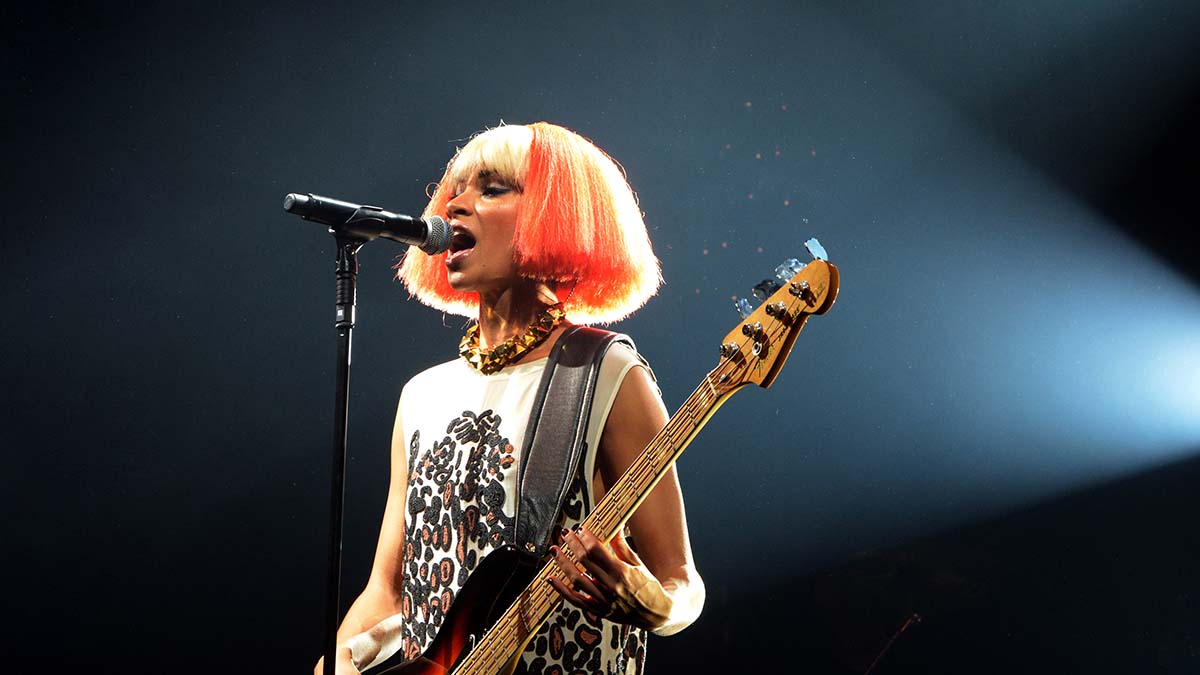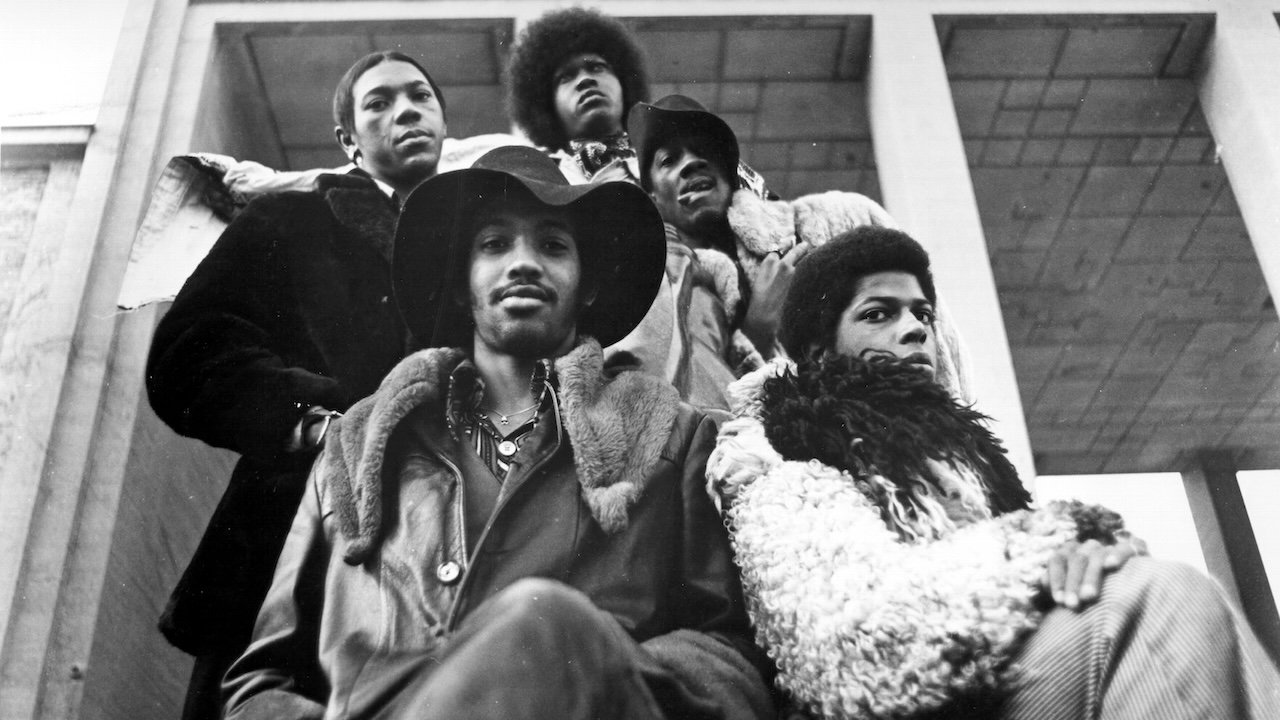Adeline: “For me, bass is about finding a good groove that people may not even notice – a good groove that I want to keep playing forever“
The bassist and producer discusses the low notes behind her phenomenal creativity

All the latest guitar news, interviews, lessons, reviews, deals and more, direct to your inbox!
You are now subscribed
Your newsletter sign-up was successful
French-Caribbean singer, bassist and producer Adeline is a prolific musician by any measure, having released no fewer than 21 songs in 2020 alone. These included two EPs, guest appearances, and collaborations with artists such as the rappers Kamauu and Lisko.
She recently announced a new single Whisper My Name, and a new production duo called Nightshade with her partner Morgan Wiley. She has toured the world with a wide range of musicians, the best known of which is CeeLo Green, with whom she delivers effortless bass grooves loaded with vintage references.
Where are you based, Adeline?
“I live in Brooklyn, New York, and the people here are amazing. It’s so encouraging and inspiring to live here, and there’s a real sense of community here too. I’ve been living in the USA since high school, but I’m still a French citizen, and I’m very much attached to my culture.“
You’ve made a lot of music lately.
“Yes – there’s definitely something to say about not being on tour and having time to create music. It’s been a different mindset, being able to get up and just focus on going into the studio and making music.“
Do you write songs on bass?
All the latest guitar news, interviews, lessons, reviews, deals and more, direct to your inbox!
“The bassline definitely comes in first or second. I have a production duo called Nightshade with my partner, Morgan Wiley, and he’s an incredible keyboard and piano player. I bring the bass and the vocal melodies, and he brings the harmony and then we create the beat together.
“Sometimes it starts with him sitting on the piano, and just finding a chord progression, or I’ll sing and we start writing a song that way. Or we’ll come up with a beat – or at least a BPM – and then I start moving the bass to the drums.“
How did you begin playing bass?
“I started playing bass super-late, after I moved to New York. I was in a few bands, playing guitar, and one day we had a show and the bass player that we hired had to cancel at the last minute. The other guys were like, ‘Hey, you play guitar – we want you to play bass.’ So I started playing bass when I was in my early twenties, which is late in the game, but at least I was a guitarist already, so I wasn’t like, ‘Oh my God, I’ve never held a string instrument.’“
Who influenced you on bass?
“My favorite bassist of all time is Joseph ‘Lucky’ Scott, Curtis Mayfield’s bass player. He had that James Jamerson approach, where he would highlight the chord, but he also had a really deep pocket. There was a melody to what he was playing. I’m a huge fan of Curtis Mayfield’s music, and Joseph was a huge part of creating that sound because he was his musical director as well. I also want to mention my mentor, Fred Cash, Jr, who’s an amazing bass player.“
We have a vintage Fender P-Bass at the studio with flatwounds on it, because I love using flats for tracking
You play a Moon bass in the video for Whisper My Name.
“That one is definitely one of my favorites, especially for shedding at home and for live shows. For recordings, we have a vintage Fender P-Bass at the studio with flatwounds on it, because I love using flats for tracking. But you know, it depends on the style. If I’m slapping, I’m obviously not so much a big fan of flatwounds for that.
“I have a Sadowsky, which is great when I want a J-Bass sound. Fender just sent me the American Professional II, which is a lovely bass. I’ve been having a lot of fun with it. For amps, I’m a big Aguilar fan. Mine is a Tone Hammer 500 with a small cabinet. I have it at home for shedding and it sounds so warm. I’ve taken that one around for little rooms and stuff. It’s great. For pedals, I like a good envelope filter like an MXR.“
How do you record your bass parts?
“Morgan’s studio has a lot of great preamps. We usually go through Neve units 90 percent of the time, and then we have fun adding the effects afterwards. Sometimes I’ll plug in the pedal after the bass is already tracked, and just rerecord through the pedal and tweak the parts like that; other times I go through the pedal first and rock that effected sound.
“It’s all about capturing the moment and capturing a feel. It’s funny, because Morgan, as a keyboard player, doesn’t always understand why I get so obsessed with the bass tones. What makes a groove magical or not, to me, is that I try to make it feel good. If the recording from the demo feels good, then I’ll just leave it that way.“
What makes a groove magical or not, to me, is that I try to make it feel good. If the recording from the demo feels good, then I’ll just leave it that way
What are your objectives when you’re recording bass?
“Tone is very important for me – the bass having its own voice in the tracks. What’s interesting is because I’m singing and also playing bass, it’s about finding that balance between being the singer and the bass player. I like to have fun with letting both of those voices express themselves and sing together. It’s also about finding a good groove that people may not even notice – a good groove that I want to keep playing forever.“
What’s next for you?
“Hopefully I’ll get to play live in the near future. I can’t wait to experience that feeling again, because we’re going through difficult times. You know, in a social and political context, it’s always music that helps you understand what’s going on, and helps you get through it. It gives you an outlet to express yourself. Music is always there to mark time – and to paint a picture of what is happening to us in a particular era.“
Bass Player is the world’s most comprehensive, trusted and insightful bass publication for passionate bassists and active musicians of all ages. Whatever your ability, BP has the interviews, reviews and lessons that will make you a better bass player. We go behind the scenes with bass manufacturers, ask a stellar crew of bass players for their advice, and bring you insights into pretty much every style of bass playing that exists, from reggae to jazz to metal and beyond. The gear we review ranges from the affordable to the upmarket and we maximise the opportunity to evolve our playing with the best teachers on the planet.

